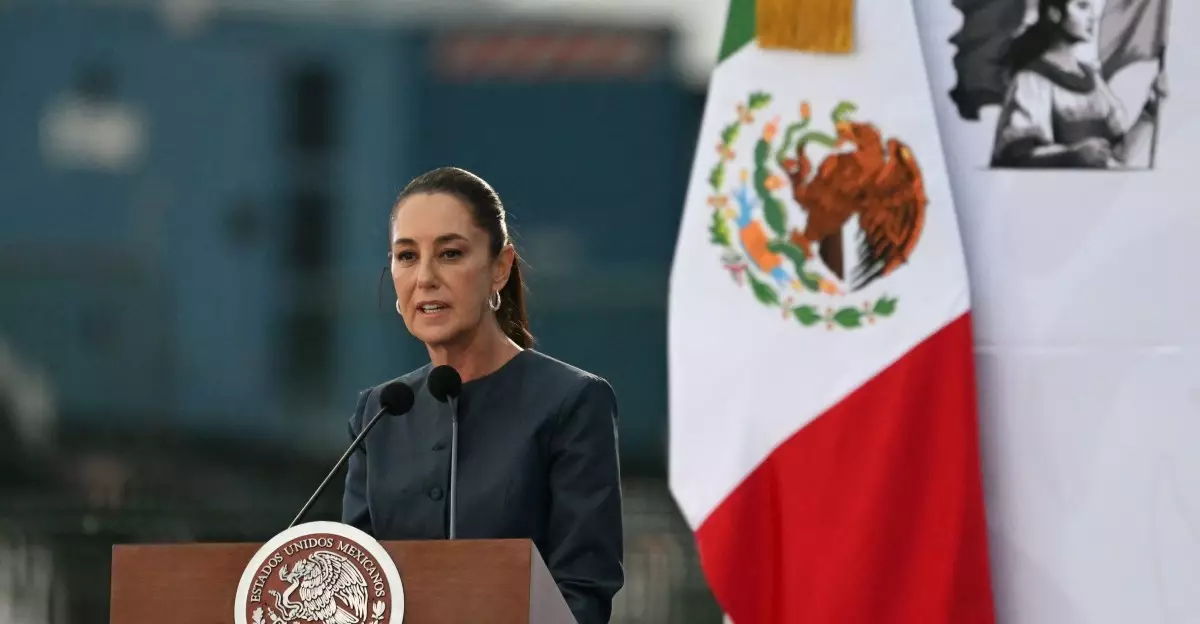The geopolitical landscape is wrought with complexities, not the least of which stem from the confluence of national identity and geographical representation. In an unexpected twist, Mexican President Claudia Sheinbaum is making headlines by standing firmly against the renaming of the Gulf of Mexico to the “Gulf of America” as per an order associated with former President Donald Trump. This name change, which has found its way onto platforms like Google Maps, ignites discussions about sovereignty, cultural significance, and the power dynamics of digital platforms.
It’s worth noting that the challenge posed by Sheinbaum is not merely about a name. It is emblematic of deeper tensions that lie beneath the surface. When a powerful country unilaterally decides to redefine a well-established geographical identity, it raises alarms about discarding a nation’s historical and cultural narratives. By asserting that the Gulf of Mexico cannot simply be renamed from the broader jurisdiction of the United States, Mexico is insisting on recognition of its sovereignty over its own waters and how those waters are referenced on the international stage.
Legal Warfare: A Show of Strength
Sheinbaum’s decision to sue Google is both a legal and symbolic maneuver. By taking this action, she is shining a spotlight on a company that plays an influential role in shaping public perception through its mapping tools. Google’s labeling can impact international understanding, making Sheinbaum’s efforts not just an act of resistance but a legal assertion of the right to dictate one’s own geographical identifiers.
“This would not have the authority to name the entire Gulf, because that is an international attribution,” Sheinbaum declared, firmly stating that the U.S. can only hold sway over its own territorial waters. Her message demands that international players, companies or governments alike, recognize and respect the cultural and historical ties that bind countries to their geographical entities. Suing Google is not just about the name; it’s about ensuring that global citizens understand the realness of these ties in a digital context.
Impact of Technology on Diplomacy
This debacle highlights how tech companies influence diplomatic relations and cultural narratives. When tools that influence millions, such as Google Maps, prioritize national directives over geographical accuracy or historical context, they risk fostering misinformation and misrepresentation. This is a defining moment in understanding the extent to which tech companies bear responsibilities typically reserved for governments.
The swift compliance of Google and other tech entities, such as Apple, with Trump’s unilateral decision illustrates an essential reality: corporate interests sometimes overshadow ethical considerations in these discussions. The repercussions of altering a geographic name are significant; it can shape public sentiment and reflect socio-political alliances. Companies should think critically about the implications of their actions, particularly when they intersect with national identities and histories.
Resistance to Cultural Erasure
The insistence of President Sheinbaum on adhering to the name “Gulf of Mexico” serves as a testament to Mexico’s resilient cultural identity. In a world of constant change, geographical names often pool in collective consciousness like sediment — they carry histories, stories, and identities. By challenging the narrative imposed by a more powerful neighbor, Sheinbaum asserts Mexico’s right to define its own story and its relationship with surrounding countries.
In the same breath, the support this case has the potential to garner can further uplift countries facing similar pressures. It is a resounding message to other nations that the act of renaming, whether physical or digital, can be contested. Countries should not only be vigilant in protecting their names but also active in shaping the narrative surrounding their identities.
The Bigger Picture
In today’s global digital environment, the question arises: who truly has the authority to define geographical identity? As technology continues to weave itself into the fabric of diplomacy and culture, the importance of assertive responses like that of Sheinbaum’s cannot be overstated. This issue is indicative of a larger battle — one where nations stand up against the homogenization of history and identity. Therefore, as the dust settles on this immediate confrontation, it leaves a trail that calls for national pride as well as cooperative respect among nations, urging us all to remember that names matter.

